Uncategorized
-
Letter to an Anti-Trump Christian Friend
Read the Townhall article: Letter to an Anti-Trump Christian Friend
-
Our Critique of Theistic Evolution Does Not Misrepresent the Biologos Position
In 2017, I was a coeditor for the book Theistic Evolution: a Scientific, Philosophical, and Theological Critique [1]. in my introductory chapter to that book, I defined theistic evolution as follows, using a definition jointly authored by the editors of the book:
God created matter and after that did not guide or intervene or act directly to cause any empirically detectable change in the natural behavior of matter until all living things had evolved by purely natural processes (p. 67).
But after the book was published, some reviews on the Biologos website objected that our definition had misrepresented their position. The primary statement of this objection was in a thoughtful and gracious review by Deborah Haarsma, President of Biologos. She proposed an alternative definition of theistic evolution (though she prefers to call it “evolutionary creation”):
God creates all living things through Christ, including humans in his image, making use of intentionally designed, actively-sustained, natural processes that scientists today study as evolution.
Haarsma adds, “God guided evolution just as much as God guides the formation of a baby from an embryo” (in the previous sentence she had cited Psalm 139:13, which says, “You formed my inward parts; you knitted me together in my mother’s womb”). She also says, “Although God in his sovereignty could have chosen to use supernatural action to create new species, evolutionary creations [sic] are convinced by the evidence in the created order that God chose to use natural mechanisms.”
However, Haarsma’s new definition does not actually conflict with our definition, but rather confirms the essence of our definition given above. We could modify our definition to add more things that she advocates, but the substance of the definition would remain, as in this example:
God created matter [with intentionally designed properties governed by “natural law”] and after that [God continued to sustain matter and preserve its natural properties but he] did not guide or intervene or act directly to cause any empirically detectable change in the natural behavior of matter until all living things had evolved by purely natural processes [which God actively sustained but did not change].
In this modified definition, I have explicitly added the Biologos belief that God actively upholds and sustains the activity of the entire natural world (as affirmed in Col. 1:17 and Heb. 1:3). I agree with that belief. But to define creation this way is to confuse God’s initial work of creation with his ongoing work of providence. (Note the present tense verb in Haarsma’s definition of theistic evolution: not “God created” but “God creates,” thus drawing no distinction between God’s initial creative work at the beginning of the universe and his subsequent sustaining work that continues today.)
The key point in our definition is the theistic evolutionist claim that God did not “cause any empirically detectable change in the natural behavior of matter” until all living things “had evolved by purely natural processes.” Haarsma does not raise any objection to this crucial part of our definition, and in fact her proposed definition affirms the same thing: “God creates all living things… making use of intentionally designed, actively-sustained natural processes.”
In another Biologos review, Jim Stump writes, “Yes, we believe that God guides evolution, the same as we believe God guides photosynthesis.”
But this is a misleading use of the word “guide.” People ordinarily use the word “guide” to refer to an action that influences the course of an object so that it changes the direction it was otherwise going. But the Biologos explanation shows that they use the word “guide” to mean “does not change the direction of an object but sustains it so that it continues in the direction it otherwise was going.” So ordinary English speakers understand “guide” to mean “change the direction of something,” but the Biologos foundation uses the word” guide” to mean “not change the direction of something,” which is just the opposite.
I conclude that our definition of theistic evolution remains accurate. The advocates of theistic evolution who are affiliated with Biologos support a viewpoint that is correctly summarized in this statement:
God created matter and after that did not guide or intervene or act directly to cause any empirically detectable change in the natural behavior of matter until all living things had evolved by purely natural processes.
[1] Edited by J.P. Moreland, Stephen Meyer, Chris Shaw, Ann Gauger, and Wayne Grudem (Wheaton: Crossway, 2017).
[2] See Deborah Haarsma, “A Flawed Mirror: A Response to the Book ‘Theistic Evolution,’” dated April 18, 2018: https://biologos.org/articles/a-flawed-mirror-a-response-to-the-book-theistic-evolution.
[3] See p. 65, n. 6 for a discussion of why we retain the term “theistic evolution.”
[4] Jim Stump, “Does God Guide Evolution?” at https://biologos.org/articles/does-god-guide-evolution.
-
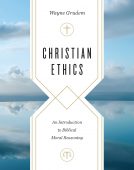
Christian Ethics
Why Did I Write My New Book on Christian Ethics?
by Wayne Grudem
I wrote my new book Christian Ethics (Crossway, 2018) for Christians who want to understand what the Bible teaches about how to obey God faithfully in their daily lives. I hope the book will be useful not only for college and seminary students who take classes in Christian ethics, but also for all other Christians who seek, before God, to be “filled with the knowledge of his will in all spiritual wisdom and understanding,” with the result that they will live “in a manner worthy of the Lord, fully pleasing to him: bearing fruit in every good work and increasing in the knowledge of God” (Col. 1:9–10).
But the book also contains a challenge. I am concerned that teaching about ethics has been neglected in many evangelical churches today—partly because the issues seem complex, partly because pastors do not want to be accused of sounding “legalistic,” and partly because the surrounding non-Christian culture is hostile to Christian moral values, so anyone who teaches biblical ethics is likely to be criticized by unbelievers. Therefore, I hope this book will help to meet a need among Christians today for more biblical ethical understanding. And I hope the book will challenge Christians to live lives of personal holiness in the midst of a secular culture.
This book is similar in its method to my earlier book Systematic Theology, because both books seek to explain “what the whole Bible teaches” about various specific topics. However, Systematic Theology dealt with theological topics such as the Trinity, the person of Christ, the atonement, and salvation, while this book deals with ethical topics such as lying and telling the truth, war, abortion, euthanasia, racial discrimination, divorce and remarriage, homosexuality, stewardship of money, wise use of the environment, and many other topics.
I hope it will be useful for all Christians who seek to experience the great blessing of God that comes from walking daily in paths of obedience, knowing more of the joy of God’s presence, and experiencing his favor on our lives.
Purchase this book -
Why Pastors Should Preach about Political Policies
Wayne Grudem at the Watchmen on the Wall Conference in Washington DC, a conference for pastors and church leaders sponsored by the Family Research Council (June 21, 2015)
-
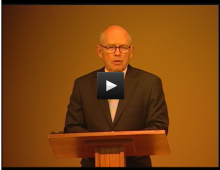
-
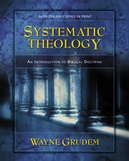
Systematic Theology
(1291 pages. This book is widely used as a theology textbook around the world. It has sold over 500,000 copies and has been translated into fifteen other languages, with at least four more foreign translations now in process — see Questions page for translation details.)
The Christian church has a long tradition of systematic theology, that is, studying theology and doctrine organized around fairly standard categories such as the Word of God, redemption, and Jesus Christ. This introduction to systematic theology has several distinctive features: – A strong emphasis on the scriptural basis for each doctrine and teaching – Clear writing, with technical terms kept to a minimum – A contemporary approach, treating subjects of special interest to the church today – A friendly tone, appealing to the emotions and the spirit as well as the intellect – Frequent application to life – Resources for worship with each chapter – Bibliographies with each chapter that cross-reference subjects to a wide range of other systematic theologies.
Purchase this book -
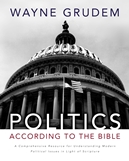
Politics – According to the Bible
(This is a 619-page reference work that discusses over 60 political issues today, grouped into 18 broad categories in its 18 chapters. You can read the entire book, or each chapter can be read on its own for areas such as national defense, the environment, economics, marriage, the protection of life, or the courts.)
Purchase this book
A variety of perspectives exist within the Christian community when it comes to political issues and political involvement. This comprehensive and readable book presents a political philosophy from the perspective that the Gospel pertains to all of life, so Christians should be involved in political issues. In brief, this is an analysis of conservative and liberal plans to do good for the nation, evaluated in light of the Bible and common sense.
In this ground-breaking book, recognized evangelical Bible professor Wayne Grudem rejects five mistaken views about Christian influence on politics: (1) ‘compel religion,’ (2) ‘exclude religion,’ (3) ‘all government is demonic,’ (4) ‘do evangelism, not politics,’ and (5) ‘do politics, not evangelism.’ He proposes a better alternative: (6) ‘significant Christian influence on government.’ Then he explains the Bible’s teachings about the purpose of civil government and the characteristics of good or bad government. Does the Bible support some form of democracy? Should judges and the courts hold the ultimate power in a nation? With respect to specific political issues, Grudem argues that most people’s political views depend on deep-seated assumptions about several basic moral and even theological questions, such as whether God exists, whether absolute moral standards can be known, whether there is good and evil in each person’s heart, whether people should be accountable for their good and bad choices, whether property should belong to individuals or to society, and whether the purpose of the earth’s resources is to bring benefit to mankind. After addressing these foundational questions, Grudem provides a thoughtful, carefully-reasoned analysis of over fifty specific issues dealing with the protection of life, marriage, the family and children, economic issues and taxation, the environment, national defense, relationships to other nations, freedom of speech and religion, quotas, and special interests. He makes frequent application to the current policies of the Democratic and Republican parties in the United States, but the principles discussed here are relevant for any nation. -
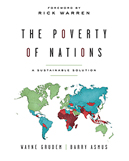
The Poverty of Nations: A Sustainable Solution
This 2013 book was co-authored by me and by my good friend Barry Asmus, a professional economist. (Barry and I have also served together as elders at Scottsdale Bible Church.) For more information about Barry Asmus see http://www.barryasmus.com/In writing The Poverty of Nations, we found that our different academic backgrounds (Barry in economics, Wayne in Christian theology and biblical studies) led us to agree on the only way to solve world poverty.Our solution is a complex one, ultimately involving seventy-eight factors. This is because we are convinced that the causes of continuing poverty are also complex. These seventy-eight factors fall in three categories that affect an entire nation: national laws, economic policies, and cultural values.
We think this book is unique because (a) it approaches world poverty from the combined perspective of Christian theology and economics, and (b) it approaches the question of poverty not at the level of the individual person or community (where much good work is already being done), but at the level of the whole nation.
Purchase this book at Barnes & Noble.com: http://www.barnesandnoble.com/w/the-poverty-of-nations-barry-asmus/1113942799?ean=9781433539114
Purchase this book at Christian Book Distributors: http://www.christianbook.com/the-poverty-of-nations-sustainable-solution/barry-asmus/9781433539114/pd/539114?item_code=WW&netp_id=1121405&event=ESRCG&view=details
Purchase this book at Amazon: http://www.amazon.com/The-Poverty-Nations-Sustainable-Solution/dp/143353911X/ref=sr_1_1?ie=UTF8&qid=1376144541&sr=8-1&keywords=grudem+poverty
Purchase this book -
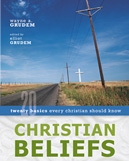
Christian Beliefs
(This is a 159-page condensation of my book Bible Doctrine, and it covers the 20 most central and basic doctrines of the Christian faith. It is suitable for use in a new members’ class in a church, or in a home study group.)
God doesn’t call every Christian to go off to seminary, but there are certain matters of doctrine—that is, the church’s teaching—that every Christian simply must know. Theology is important, because what we believe affects how we live. If you’re a relatively new believer in Jesus, or if you’re a more mature Christian looking for a quick brush-up on basics of the faith, Christian Beliefs is for you. This readable guide to twenty basic Christian beliefs is a condensation of Wayne Grudem’s award-winning book on systematic theology, prized by pastors and teachers everywhere. He and his son, Elliot, have boiled down the essentials of Christian theology for the average layperson and made them both clear and applicable to life. You will learn about the Bible, the characteristics of God, what it means that we are created in the image of God, what God has done for us in Christ, the purpose of the church, and much more. Each chapter includes questions for personal review or group discussion.
“These truly are twenty basic beliefs that every Christian should know. Wayne Grudem is a master teacher with the ability to explain profound truths in simple language. He is a man of deep conviction and theological passion—and those who read this book will be both educated and encouraged in the faith.” -R. Albert Mohler Jr., President, The Southern Baptist Theological Seminary, Louisville, Kentucky
“Based on Systematic Theology, this summary will certainly help beginners with Christ to get the hang of their faith.” -J. I. Packer, Regent College, Vancouver, British Columbia
“As Wayne Grudem’s Systematic Theology contracts into a compact book, I do not lose my enthusiasm for the truth he loves and the clarity of his words.” -John Piper, Bethlehem Baptist Church, Minneapolis, Minnesota
Purchase this book -
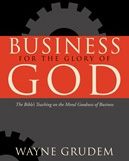
Business for the Glory of God
Purchase this book(96 pages) Can business activity in itself be morally good and pleasing to God? Sometimes business can seem so shady–manipulating the “bottom line,” deceiving the consumer, or gaining promotions because of whom you know.
But Wayne Grudem introduces a novel concept: business itself glorifies God when it is conducted in a way that imitates God’s character and creation. He shows that all aspects of business,including ownership, profit, money, competition, and borrowing and lending, glorify God because they are reflective of God’s nature.Though Grudem isn’t naïve about the easy ways these activities can be perverted and used as a means to sin, he knows that Christians can be about the business of business.
This biblically-based book is a thoughtful guide to imitating God during interactions with customers, coworkers, employees, and other businesses. See how your business, and your life in business,can be dedicated to God’s glory.
-
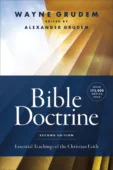
Bible Doctrine
(This is a 528-page condensation of my book Systematic Theology.)
How do we know the Bible is God’s Word? What is sin, and where did it come from? How is Jesus fully God and fully man? What are spiritual gifts? When and how will Christ return? If you’ve asked questions like these, then ‘systematic theology’ is no abstract term. It’s an approach to finding answers every Christian needs to know. Bible Doctrine takes a highly commended upper-level textbook on systematic theology and makes it accessible to the average reader. Abridged from Wayne Grudem’s award-winning Systematic Theology, Bible Doctrine covers the same essentials of the faith, giving you a firm grasp on seven key topics: The Doctrine of the Word of God, The Doctrine of God, The Doctrine of Man, The Doctrine of Christ, The Doctrine of the Application of Redemption, The Doctrine of the Church, and The Doctrine of the Future. Like Systematic Theology, this book is marked by its clarity, its strong scriptural emphasis, its thoroughness in scope and detail, and its treatment of such timely topics as spiritual warfare and the gifts of the Spirit. But you don’t need to have had several years of Bible school to reap the full benefits of Bible Doctrine. It’s easy to understand…and it’s packed with solid, biblical answers to your most important questions.
Purchase this book -
Why Theology Is Important
Dr. Wayne Grudem, Research Professor of Theology and Biblical Studies at Phoenix Seminary, speaks on “Why Theology is Important”. This lecture took place on October 28th, 2010 at the Arizona Biltmore. This video is part 1 of 3.
-
A Theology of Work/Vocation
Theologian Wayne Grudem discusses the intersection of work and ministry.
This video is a part of the Leadership Lecture Series, and was recorded September 15, 2011 at the Talbot School of Theology Faculty Retreat in La Quinta, CA
-
WHAT ARE THE CONSEQUENCES OF DIVORCE?
A Summary of Some of the Findings in the Book: Second Chances: Men, Women, & Children a Decade After Divorce by Judith S. Wallerstein & Sandra Blakeslee (New York: Ticknor & Fields [Houghton Mifflin], 1989)
Wayne Grudem, Ph.D.
Professor of Biblical and Systematic Theology Trinity Evangelical Divinity School Deerfield, Illinois
July 31, 1996 -
What is unique about Phoenix Seminary?
Dr. Wayne Grudem, Research Professor at Phoenix Seminary, talks about Phoenix Seminary’s ministry philosophy, “Scholarship with a Shepherd’s Heart”. This is part 1 of 3 parts. Part 1 is on “Scholarship”.
-
What books have most strongly influenced you?
Books that strongly influenced me:
After book (1) below, it is an impossible question for me to answer exactly. Many books have influenced me at different times. Here are eleven that influenced me quite early in my Christian life (all but #3 and #10 and #11 while I was still in college, before I went to seminary), plus #12, which influenced me many years later.
(1) The Bible, far beyond all other books combined.
(2) John Calvin, Institutes of the Christian Religion
(3) Louis Berkhof, Systematic Theology
(4) J. Gresham Machen, Christianity and Liberalism
(5) Cornelius VanTil, The Defense of the Faith
(6) D. M. McIntyre, The Hidden Life of Prayer
(7) John Murray, Principles of Conduct
(8) John Murray, Redemption: Accomplished and Applied
(9) B. B. Warfield, The Plan of Salvation
(10) B. B. Warfield, The Inspiration and Authority of the Bible
(11) Geerhardus Vos, Biblical Theology
(12) John Wimber, Power Evangelism -
Do you have any books to recommend on a Christian view of economics?
My first recommendation is Jay Richards’ excellent book, Money, Greed, and God: Why Capitalism is the Solution and Not the Problem (New York: HarperOne, 2009). In addition, see my annotated list of other helpful (and not so helpful) books on economics here:
- 1. David Landes, The Wealth and Poverty of Nations: Why Some Are So Rich and Some So Poor. (1999). Landes is professor emeritus of economics at Harvard and also taught at George Washington University. This is a masterful survey of the history of economic development in the entire world, by region, over the last 500 years.
- 2. Lawrence E. Harrison, The Central Liberal Truth: How Politics Can Change a Culture and Save It from Itself (New York: Oxford Univ. Press, 2006). Argues in extensive detail that culture makes all the difference in economic development, and explains how cultures can change. Pp. 88-89 give a table showing vastly greater per capita GDP in Protestant-background countries than for any other religious group: the rest are, in order: (2) Jewish, (3) Catholic, (4) Orthodox, (5) Confucian, (6) Buddhist, (7) Islam, (8) Hindu.
- 3. Hernando De Soto, The Mystery of Capital: Why Capitalism Triumphs in the West and Fails Everywhere Else. An excellent, insightful book about the need for people to have the right to own property and relatively easy access to obtain a publicly documented title to that property, in order for an economy to grow and people to overcome poverty.
- 4. William Easterly, The Elusive Quest for Growth (he has also written The White Man’s Burden more recently but I have not read it yet). Why aid to Africa has never really solved the problems of poverty in Africa.
- 5. P. T. Bauer, Equality, the Third World, and Economic Delusion. Bauer died in 2002. He was emeritus professor of economics at London School of Economics and a specialist in development economics. He tells in detail why all the British aid to African countries over decades did more harm than good: It distorted local economies and entrenched corrupt governments in power, and had many other negative consequences.
- 6. Robert Guest, The Shackled Continent (anecdotal; written by Africa editor for The Economist). He describes in vivid detail the barriers to economic development in Africa.
- 7. Brian Griffiths, The Creation of Wealth (taught at London School of Economics and was adviser to Margaret Thatcher; now in House of Lords). Gives principles for a Christian perspective on how economies grow.
- 8. Bjorn Lomborg, The Skeptical Environmentalist . Lomborg shows that we are not running out of any natural resource, and we won’t run out in the future. But the world is short on knowledge of true facts about the state of natural resources. (Lomborg is a professor of statistics from Denmark.)
- 9. Several writings of Julian Simon, esp. The Resourceful Earth, and The State of Humanity, and The Ultimate Resource II. (Simon was a professor of business and economics in Maryland.)
- 10. Dambisa Moyo, Dead Aid: Why Aid is Not Working and How There is a Better Way for Africa (2009). Moyo is from Zambia, has a MA from Harvard and a Ph.D. in economics from Oxford. She was a consultant for the World Bank and then worked at Goldman Sachs. Her argument foreign aid has done more harm than good for Africa and has trapped nations in poverty: It entrenches corrupt African governments in power, provides “fungible” money that funds profligate lifestyles, creates internal conflicts for control of vast wealth, removes government accountability to the citizens of a country, creates a mentality of dependence, prevents beneficial investment, and has never brought any African country out of poverty. But she wrongly believes that if foreign aid is stopped, good governance “will naturally emerge” (p. 143.).
B. Here are some books on economic systems in general, and the great flaws of socialism and government control:
- * 11. Jay Richards, Money, Greed, and God: Why Capitalism Is the Solution and Not The Problem (HarperOne, 2009). This is now my #1 recommendation for people who want to understand economic systems from a Christian point of view.
- 12. Arthur Brooks, The Battle: How the Fight Between Free Enterprise and Big Government Will Shape America’s Future. (Basic Books, 2010). Brooks argues that what gives people genuine satisfaction in the economic realm is not to be given money but to achieve “earned success” – the opportunity to have a responsibility (even if small) and to do well at it.
- 13. Friedrich Hayek, The Road to Serfdom. Hayek was Austrian and fled from Hitler. He became an economics professor at London School of Economics. He watched with dismay as socialism grew in England. He explains how government control expands inch by inch until it takes over all of life. This is an all-time classic that was written in 1944, with a 50th anniversary edition released in 2004.
- 14. Henry Hazlitt, Economics in One Lesson. Hazlitt was a long time editor at the Wall Street Journal. This book was first published in 1946 and has become a classic. It is a wonderful book that explains how every action in the economy has more than one consequence, and when we realize this we can understand better how an economy works.
C. Here are two books that I found unpersuasive (or wrong) in terms of explaining why nations become wealthy:
- 14. Jared Diamond, Guns, Germs, and Steel (I found this unconvincing because it was completely materialistic and deterministic, from an entirely evolutionary perspective, allowing no role for human choice and decisions and initiative. He thinks physical geography determines everything!)
- 15. Jeffrey Sachs, The End of Poverty (I found this unconvincing for the most part, because I heard him saying that we have given X amount of money in the past but that has not solved the problem so the solution is that we need to give X + 1 or even 2X the amount and that will solve the problem). Sachs is an economics professor but he also has another job advising the United Nations how to give such money away.
-
How can I find your book Systematic Theology in other languages?
Translation contact information for Systematic Theology by Wayne Grudem (Leicester, England: IVP, and Grand Rapids, Michigan: Zondervan, 1994). 1290 pages.
Translation permission for Systematic Theology is handled by Stephen Tyers at InterVarsity Press in Leicester, England. E-mail: st@ivpbooks.com
Translation permission for Bible Doctrine (528 pages) and Christian Beliefs (160 pages) is handled by Zondervan, Grand Rapids, Michigan. (616-698-6900). Contact Seamus Dillion seamus.dillion@zondervan.com or Angela Tegg angela.tegg@zondervan.com.
The following information is current as of April 24, 2016:
A. Completed translations of Systematic Theology:
1. Korean (in 3 vols)
Eunsung Publishers
126-60 Sangdo 5-dong
Dongjak-gu
Seoul
Korea
Fax: 82-2-813-9072
Email: esp4404@hotmail.com2. Portuguese
Edicoes Vida Nova,
Caixa Postal 21.486,
CEP 04602-970,
Sao Paulo, Brazil.
Phone/Fax (+55 11) 5666-1911
Email: vidanova@vidanova.com.br3. Arabic (in 3 vols)
The Program for Theological Education by Extension
P.O. Box 1931
Amman 11118
Jordan
Phone/Fax: (962) 6 4610982
Email: pteemail@ptee.org4. Russian – published early 2005. (MIRT publishers). ISBN 5-88869-160-7
5. Romanian: published in late 2004 or perhaps January 2005. Slavic Gospel Association in Europe has taken leadership on this but I don’t have contact info.
6. Spanish: published in 2007. Teología Sistemática (Miami, FL: Editorial Vida, 2007). ISBN 13-978-0-8297-4627-3.
7. French: published in 2010. Théologie Systématique. (Charols, France: Excelsis SARL, 2010). ISBN 978-2-7550-0105-1. www.XL6.com.
8. Chinese (Mandarin): published (in traditional Chinese characters) in May, 2011. Christian Renewal Mission, Blk 203 Hougang Street 21, #02-89, Singapore 530203. E-mail: crmsg77@yahoo.com.sg or crm7hk@gmail.com. Translator: Paul Chang. The contract is for publication in both “Regular Script” and “Simplified Script.”
9. Amharic (in Ethiopia): vol. 1 published early 2013, vol. 2 expected soon after that. Published by Bible Based Books (SIM Publishing) and Kale Heywet Church.
10. German: Published June, 2013, by Verlag für Kultur und Wissenschaft.
http://www.vkwonline.de/biblische-dogmatik.html.
Also available from Amazon.com in Germany: http://www.amazon.de/Biblische-Dogmatik-Einf%C3%BChrung-systematische-Theologie/dp/386269066011. Jinghpaw (Kachin people – Northern Myanmar): volume received 4-7-14. Sponsored by Bethlehem Baptist Church, Minneapolis. [no publisher, location, or date given in the volume]
12. Italian: Published December, 2014. Teologia Sistematica (Chieti Scalo, Italy: Edizioni GBU, 2014.) ISBN 978-88-96441-64-0. Contact: Edizioni GBU, Via Colonnetta 80, 66013 Chieti Scalo, ITALIA. Cell. (+39) 345 5217945 http://www.edizionigbu.it (Also available from Amazon.it in Italy: https://www.amazon.it/Teologia-sistematica-Introduzione-principali-dottrine/dp/8896441641 )
B. Translations under contract and in progress for Systematic Theology, but not yet published
1. Albanian: Permission granted to Center for Christian Leadership in Tirana. They are aiming for a digital publication, probably in 2017.
2. Tamil: in process (Sri Lanka)
3. Nepali: permission given April 4, 2007.
4. Swahili: Discussions underway.
5. Tajik: for Tajikistan. Agreement signed Nov. 5, 2010.
6. Hindi: for India: Agreement in negotiation, Dec. 2010.
C. Translations of Bible Doctrine (528 pages)
The shorter form of Systematic Theology, a 528-page book called Bible Doctrine, has been made available in some foreign translations. I am aware of the following:
1. Chinese: 3 vols. in Chinese (3 vols., published April 2002). It was produced by Fellowship of Evangelical Students in Hong Kong, and the e-mail address for the publisher is publish@fes.org.hk. The ISBN is 962-8266-6.
2. Spanish: Published as Doctrina Biblica by Vida publishers (Miami), 2005. (Vida is a subsidiary of Zondervan).
2. Turkish: translation of Bible Doctrine published in 2005. (Yeni Yaşam Yayınları) ISBN: 9758318829
www.yyyayinlari.com3. Mongolian: Translation of Bible Doctrine published in 2008.
Publisher: Библийн Сургалтын Төв
http://www.ubtc.edu.mn/
Address: Bibliin Surgaltiin Tuv, Bayazurkh District, 2nd khoroo, 805 dugaar angiin khashaand, Ulaanbaatar, Mongolia
Mailing Address: POB-473, Ulaanbaatar-49, Mongolia
Phone: 976-11-462909
Fax: 976-11-462910D. Translation permission, DVDs, audio files, other notes:
2. DVD lecture series: There is now a set of 20 of my theology lectures, 40 minutes each plus 15 min. Q & A, on DVDs. These lectures cover the 20 basic doctrines discussed in Christian Beliefs, a short, 160-page version of Systematic Theology.
The DVDs are available from ClearCutMedia in the UK. http://www.clearcutmedia.tv/shop/
(Available in European format but not yet in US/ Canada format – expected in early or mid-2010.)3. Audio lecture series: Wayne Grudem taught through the entire contents of Systematic Theology for an adult Bible class at Scottsdale Bible Church in 2005-2009. Most of these audio lessons (plus outlines) are available from this web site:
http://www.christianessentialssbc.com/messages/4. CD of Systematic Theology for installation on your computer: Available from Bits&Bytes Computer Resources, 623 N. Iowa Ave, Whitefish, MT 59937. E-mail: info@bitsbytescomputer.com. Phone 800-361-7280. fax 406-862-0876.
5. Other electronic forms: Systematic Theology is available in several electronic forms from www.Amazon.com.
It is also available from OliveTree.com for several PDA formats. -
Why did you move from Trinity Evangelical Divinity School to Phoenix Seminary in 2001?
The short answer is that I moved because of my wife Margaret’s health. That is explained in this article:
But now after several years I can see that God had additional purposes for this move, because the time here has been wonderfully blessed by God through fellowship with faculty colleagues, through relationships with students, through Scottsdale Bible Church, and through many other circumstances that have made it possible for me to be very productive in my writing projects (see books section).